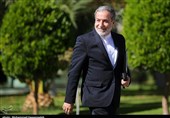Scientists from Japan, Canada Win Nobel Prize in Physics
TEHRAN (Tasnim) - Two scientists have won the Nobel Prize in Physics for their groundbreaking work showing that neutrinos -- electrically neutral subatomic particles -- have mass, contrary to what had been thought.
The prize was awarded to Takaaki Kajita and Arthur B. McDonald, the Nobel Committee said Tuesday, "for the discovery of neutrino oscillations, which shows that neutrinos have mass."
Kajita works at the University of Tokyo, in Kashiwa, Japan. McDonald works at Queen's University, in Kingston, Canada.
The Nobel Committee said the discovery -- arcane to nonscientists -- has changed our understanding of matter, and may yet change our view of the universe, CNN reported.
"The Nobel Prize in Physics 2015 recognizes Takaaki Kajita in Japan and Arthur B. McDonald in Canada, for their key contributions to the experiments which demonstrated that neutrinos change identities," the Nobel Committee's statement said. "This metamorphosis requires that neutrinos have mass. The discovery has changed our understanding of the innermost workings of matter and can prove crucial to our view of the universe."
A neutrino is "an elementary particle which holds no electrical charge, travels at nearly the speed of light, and passes through ordinary matter with virtually no interaction," according to the physics.about.com website.

Arthur McDonald of Queen’s University and Takaaki Kajita of the University of Tokyo. Photograph: Queens University/Kyodo News via AP
Scientists say that neutrinos, because they interact weakly with other particles, can probe environments that other kinds of energy, such as light or radio waves, cannot penetrate.
In the coming days, the Nobel committee also will announce prizes in chemistry, literature, peace and economics.
On Monday, three scientists shared the Nobel Prize in Medicine for their work on parasitic diseases.
Swedish industrialist Alfred Nobel created the prizes in 1895 to honor work in physics, chemistry, literature and peace. The economics prize, established in 1968 as a memorial to Nobel, was first awarded in 1969.





